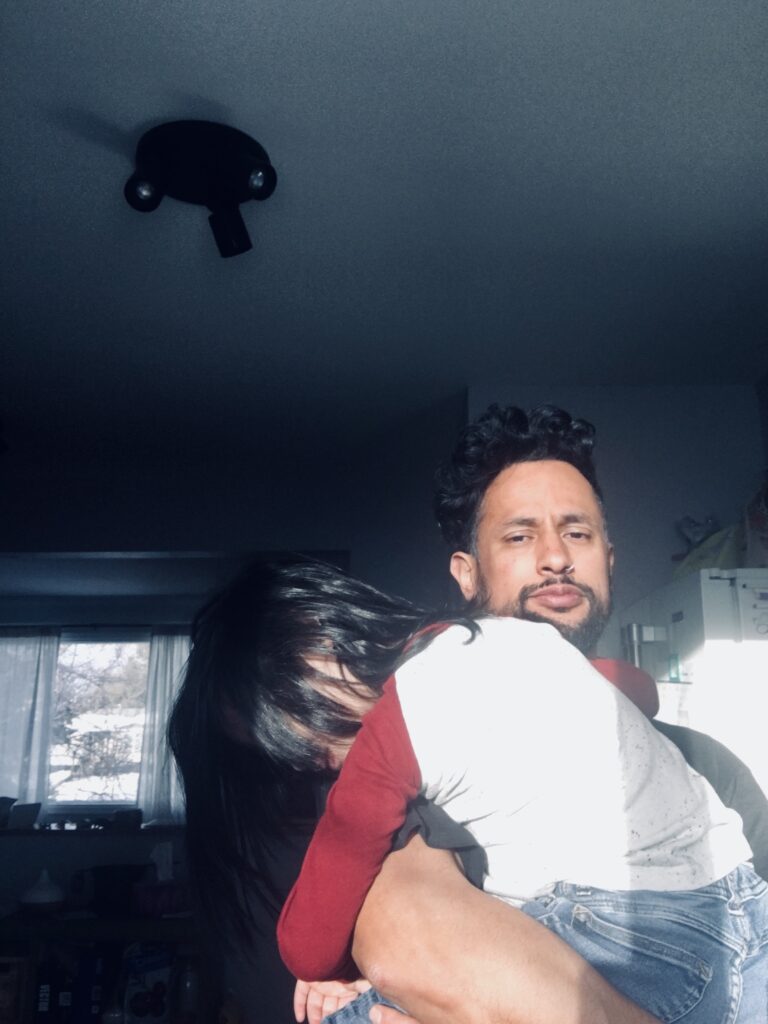
I was cleaning the kitchen and without any prompts Onyx held his hands up because he wanted to be held. It is easy to forget he is only 4 years-old when he’s always in the fray with brothers double his age. He has a raspy voice, can sometimes win a game of Children’s Sequence game against the adults of his household, and is stubbornly independent about everything. But in this moment he was my little baby again. So I stopped what I was doing and scooped him up and held him.
I squeezed him tight and whispered, “You’re my baby boy and I love you so so much.” In his chain-smoker voice he whispered, “I know.”
I recently read a book where they cited a study on how trauma in children can be treated by creating new memories of love and kindness. Past models of thought emphasized the need to re-visit the trauma over and over again to get to “the root” of it. Yet, new evidence shows how this is more damaging as past memories, when re-visited, have an emotional and physiological effect as if it were happening again. They discovered instead that healing can occur when a new template of healthy relationships and boundaries is consistently experienced. In other words, a “new normal” is not just a way forward but a path towards healing.
So, how do we step into this New Year after everything we saw, heard, felt, and lived through? For starters, let’s acknowledge that little has changed. COVID infections are on the rise and while vaccines have begun their roll-out, it will still be many months before we can flatten the curve and ease on the restrictions. Frontline health workers are overwhelmed and our teachers are exhausted. We cannot waver in wearing our masks, staying home, and being physically distant from others.
And yet, so much has changed. The grief, anger, disillusion, and anxiety has altered us in numerous ways. For some, it’s been more traumatic than others. Loss of employment, days of hospitalizations without knowing what the prognosis would be, isolation from others, and lack of control on how to make things better have depleted our internal reservoirs of hope. The truth is, life has always been this way but it’s taken a pandemic to reveal how much more vulnerable and fragile we really are. This is both a curse and a gift.
There are strident things we can do to toughen our resolve and fight for a more equitable world. We can scribble a semi-coherent list of goals for 2021 that will motivate us to drink less alcohol and read more books. But I truly wonder if what we need most is to create space for the pain while we adjust and create new patterns of living. In other words, could we embrace a “new normal” rather than fight for the old one?
I think of how #BlackLivesMatters exposed the corrosion of racism often glossed over by glimmering statements of inclusion and reconciliation. Why fight for the status quo at the expense of Black, Brown, and Indigenous bodies? How many more people have to die before we listen and learn?
I think of the economic disparity that became glaringly obvious as corporations like Loblaws and Amazon profited from the pandemic while the workers, hailed as heroes, are not compensated enough for what they do. I think of the migrant workers who despite harsh working conditions in the midst of a pandemic, have to struggle with little to no rights. We eat because of them and yet we know little of their plight. Can a world exist where ‘trickle down economics’ isn’t seen as the only engine for prosperity? Can we imagine and create something better for all?
I think of the Christian faith and how many have been indoctrinated by leaders and media outlets that worship at the altar of conspiracy theories. I lament how the witness of Jesus has suffered under the banner of “personal freedom” and “the right to worship”. How does exposing others to a virus promote the message of love and compassion? How do these religious services honour the frontline health workers who are actually healing the sick and comforting the afflicted?
In that moment, after holding Onyx in the kitchen, I did something stupid. I grabbed my camera and took a photo of us. The minute Onyx noticed he squirmed out of my arms. He did not want to be photographed. It was as if our snuggle was sacred and I had defiled it by taking a picture of it. In my attempts to memorialize the past I sacrificed the present. My days of standing in the kitchen holding my baby son have an expiry date. I only have a few more of them left so why squander them for a photo op?
Maybe, what we need most is to be present to it all with our eyes wide open and our arms fully extended. Maybe, our “new normal” is examining everything that’s been exposed about ourselves and the world we are creating and decide what needs to be changed and what needs to be held tight.

This is a fantastic summary of the sacred struggle and the sacred snuggle. Thank you for sharing.
Well said!